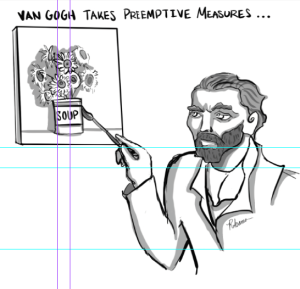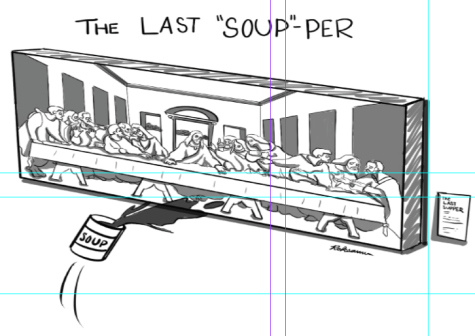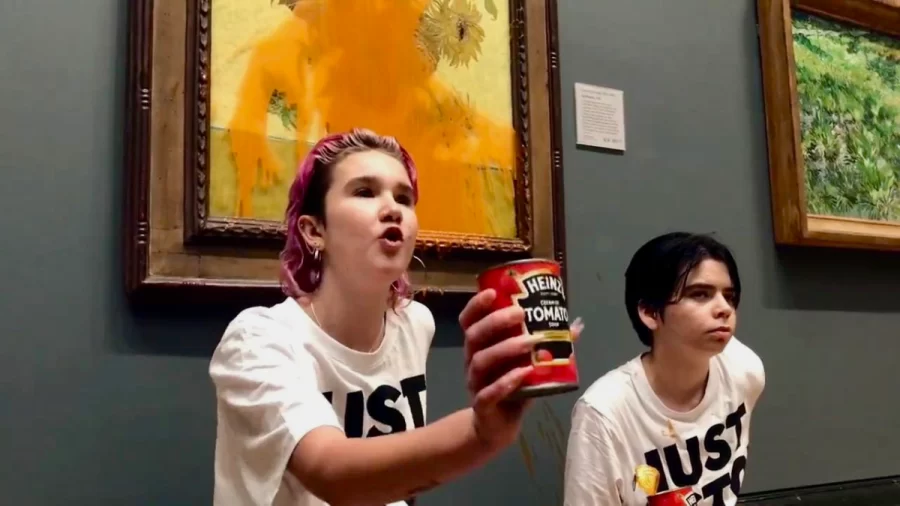Mixing tomato soup with oil
Activist demonstration spurs controversy
Two activists with Just Stop Oil speak to onlookers after throwing tomato soup on Vincent Van Gogh’s “Sunflowers”.
November 1, 2022
On Oct. 14, two protestors from the activist group Just Stop Oil threw tomato soup on one of Vincent van Gogh’s most famous artworks, “Sunflowers”. The demonstration took place in Room 43 of the National Gallery in London.
The two activists, 21-year-old Phoebe Plummer and 20-year-old Anna Holland, threw tomato soup on “Sunflowers” before sitting on the floor in front of the painting and gluing their hands to the wall below the iconic artwork.
With her hands glued to the wall, Plummer spoke to the room of onlookers.
“What is worth more – art or life?” Plummer asked. “Is it worth more than food? Worth more than justice? Are you more concerned about the protection of a painting, or the protection of our planet and people? The cost of living crisis is part of the cost of oil crisis. Fuel is unaffordable to millions of cold, hungry families. They can’t even afford to heat a tin of soup.”
Both Plummer and Holland were arrested and charged with criminal damage and aggravated trespass. The women appeared at a hearing at Westminster Magistrates’ Court on Oct. 15 and pleaded not guilty to criminal damage to the painting’s frame. They were released on bail with a trial date set for Dec. 13 at the City of London Magistrates’ Court.

Painted in 1888, the famous “Sunflowers” painting is worth about $80.99 million. While there is minimal damage to the frame, the painting itself is unharmed after the incident. The painting — covered by glass — was cleaned and put back in place that Friday afternoon, six hours after the incident occurred.
The spokesperson for the group, Mel Carrington, stated that the activists did not intend to damage the painting, which they knew was covered by protective glass. They only wanted to spark awareness and debate.
“Today’s action comes after two weeks of continued civil resistance by supporters of Just Stop Oil,” Carrington said in a press release. “The disruption is in response to the government’s inaction on both the cost of living crisis and the climate crisis.”
Only three months earlier, different Just Stop Oil members pasted paper over another famous work of art, John Constable’s “The Hay Wain”. These protests are part of the group’s larger movement to challenge the use of fossil fuels and promote discussion about climate and environmental issues.
In Glasgow, five Just Stop Oil members held a similar demonstration at the Kelvingrove Art Gallery and Museum in July 2022 during which they glued themselves to a famous artwork — this time Horatio McCulloch’s “My Heart in the Highlands”.
Just Stop Oil has held about half a dozen similar protests. The group is now being copied by activists in Italy and Germany.
The aims of the activists are noble ones: to convince the U.K. government to cease the progression and manufacturing of fossil fuels, as well as to promote further discussion among a broader audience about the challenges to our earth. This particular soup demonstration was spurred by a decision from the U.K. government and former Prime Minister Liz Truss to explore new areas for obtaining oil and gas in the North Sea. The government also nullified a fracking ban that was introduced in 2019.

Thus, in an effort to bring awareness to these issues, Just Stop Oil has been targeting these paintings because of their use of oil paints. For the past two weeks, the group has held numerous protests in London. On their organization’s website, there are numerous articles regarding their actions and protests.
The recent incident concerning the beloved van Gogh painting has taken the internet and social media by storm. Plummer and Holland have gone viral on social media platforms — one of their videos gaining 11 million views. Perspectives on the actions of Just Stop Oil are mixed as heated debates arise on Twitter.
The group has been the subject of criticism from other environmental groups and individuals across the political spectrum. Conversely, they have been applauded by figures such as NASA climate scientist Peter Kalmus. Others, such as University of Pennsylvania climate scientist Michael Mann, fear that Just Stop Oil’s vandalism will deter some people from activism aimed at climate issues as a whole.
“They’re very intense,” Caroline Mederos (‘26), an Art History major at Wake Forest, said. “I’m extremely upset that they chose to target a painting at all — let alone one by such an unproblematic artist — to attempt to get global attention when there are so many other ways that public attention can be achieved.”
However, the group did achieve its goal of garnering public attention. It is now time to see what they will do with it. While they gained attention and views on media platforms, Just Stop Oil has also disillusioned individuals with their methods, likely affecting the appreciation of the larger issues they address. Climate change and the effects of fossil fuel use on the declining environment are pressing issues — no doubt — but the means of gaining help for the planet are important to consider as well.






















